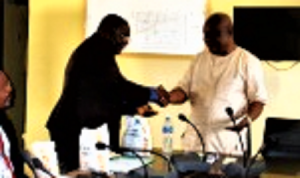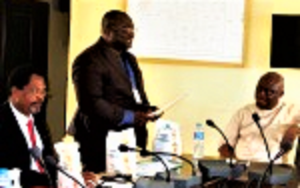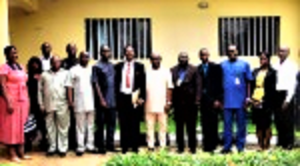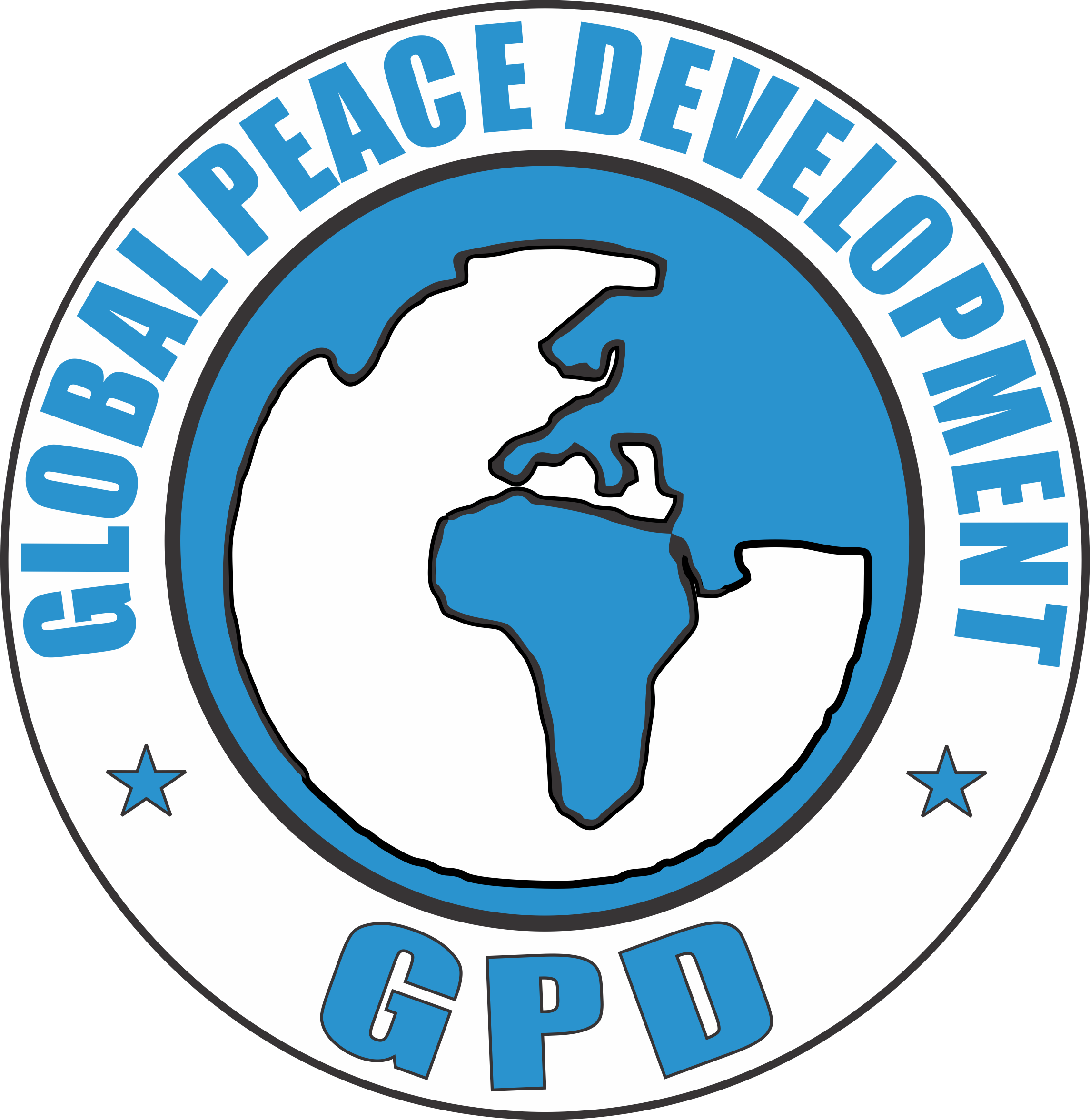OVERVIEW OF THE DSCMA MULTI-STAKEHOLDER PLATFORM
The Delta State Conflict and Management Alliance (DSCMA) convened by Global Peace Development is a multi-stakeholder platform supported by the Nigeria Stability and Reconciliation Programme (NSRP) with funding from the UK Department of International Development(DFID).
The primary objective of the DSCMA is to improve conflict management mechanism by encouraging broad societal participation in and oversight of conflict management mechanism. Specifically to achieve this aim, the DSCMA coordinates multi-stakeholders with the following objectives:
- Improved capacity and effectiveness of communities and relevant institutions to respond to violence and promote peaceful co-existence.
- Improved effectiveness of security agencies in prompt response to early warnings and referrals from the DSCMA
- Increased synergy between relevant institutions, security agencies, local stakeholders and the DSCMA platforms towards the non-violent resolution of conflicts in Delta State.
- Influence policy and practice changes that promotes conflict resolution, stability and reconciliation.
INTERVENTIONS AND ACTIVITIES
ADVOCACY ON THE IMPLEMENTATION OF THE PEACE AND VIGILANTE COMMISSION LAW, 2013.
The Delta State Conflict Management Alliance (DSCMA) since inception has undertaken several advocacy visits to key stakeholders and agencies within the state which include the Commissioner of Police, Chief Justice of the State, Secretary to the State Government, Executive Chairmen of Local Government, Delta State Peace and Advisory Council, and other relevant stakeholders. this was aimed at facilitating the implementation of the Peace and Vigilante Commission Law which was passed and assented to by the former Governor of Delta State; Emmanuel E. Uduaghan in 2013.
From the provisions of the law, activities of the different vigilante groups across the states are to be unified and managed by the Peace and Vigilante Commission to facilitate community policing and neighborhood watch thereby checkmating crime in communities across the state. The DSCMA platform has sustained a continuous action towards the implementation of the law in the state.


POST- ELECTION FORUM
Likewise, the DSCMA convened a Post -Election Forum after the 2015 general elections. The forum featured representative from the Delta State Independent Electoral Commission (DESIEC), National Independent Electoral Commission (INEC), Department of State Services (DSS), the Nigerian Police Force, Ministries, Departments and Agencies, the Nigeria Stability and Reconciliation Programme (NSRP), religious groups, women and youth group, persons living with disabilities.
The forum reviewed the 2015 elections and proposed the following action points for a violence free election in future;
- comprehensive training of adhoc staff before elections
- law offenders should be prosecuted to serve as deterrence to others and a law should be enacted to punish election offenders;
- Accreditation and voting should be held simultaneously to guarantee early completion of voting;
- Professional and impartial conduct processes by CSOs and the security agencies;
- Encourage continuous voters’ education;
- Candidates for political offices and political parties should be held liable for utterances made before, during and after elections especially those inciting violence.
- As output, post-election compendium was developed, published and disseminated to relevant stakeholders in the state.
STRATEGIC INTERVENTION OF CONFLICT OVER ACESSS TO GRAZING LAND IN DELTA STATE
In 2016, the DSCMA carried out a conflict mapping and analysis of the herdsmen and farmers clashes in Delta State. 10 LGAs were surveyed viz a viz community members and cattle breeders. The survey by the Conflict Analysis Committee of the Delta State Conflict Management Alliance was aimed at unraveling the root causes of tension and conflict between herdsmen and farmers in Delta State. Two major categories of herdsmen identified were the settled/domiciled herdsmen in the state and the Nomadic herdsmen. The members of the Miyetti Allah Cattle Breeders Association informed the committee that the wanton destruction of farms, attack of farmers and rapes were perpetrated by the criminal elements among the nomadic herdsmen. The outcome of the intervention are highlighted below
- Conducted 2 training workshops for herdsmen, Religious leaders and community stakeholders to manage conflict over access to pasture non-violently.
- Facilitated 9 mediation meetings with herdsmen, farmers and communities (Obiaruku, Abraka, Ofagbe, Ossissa communities).
- Facilitated 1 joint mediation meeting for herdsmen, religious leaders, farmers and community stakeholders which resulted in a signed joint agreement.
- Conducted conflict mapping and analysis of herdsmen and farmers clashes in the state to unearth the root causes of the conflict as well as actors.
- Early warning and prompt action through mediation and dialogue.
- Joint communiqué produced between representatives of herdsmen and farmers during a joint media dialogue in Delta State.
- Application of conflict sensitivity sill/early warning processes in preventing the escalation of violent conflict between herdsmen and Okpare-Olomu clan by facilitating a peaceful agreement reached between the disputing parties.
- Conducted policy advocacy visits to the state commissioner of Police, Director Department of State Services and Attorney General to provide recommendations on resolving the violent conflict.
INTELLIGENCE GATHERING AND REFERRALS
The DSCMA has widely disseminated and dedicated conflict tracking hotlines to report and refer violence and conflict incidences through neighborhood watch. Since inception, over 100 cases have been recorded through the conflict tracking tool. Reports from these hotlines are sent directly to the security agencies for prompt responses.
Activities and Deliverables
- Conduct conflict information gathering and analysis
- Conduct media dialogue and Advocacy
- Conduct Town Hall on post-election forum
- Hold DSCMA bimonthly meetings
- Conduct Town Hall meetings on the simplified Delta State peace and vigilante commission law
Beneficiaries
DSCMA has nine beneficiaries which include: Religious Bodies, NGOs/CSOs, National Youth Council of Nigeria, Public Administrators, Security Agencies, Women Peace and Security Network, National Council of Women Societies, Traditional Rulers, NUT and persons with disabilities.
Project status
This project is on going.
Dates
DSCMA started March 2014
Partners
- Nigeria Stability and Reconciliation Programme (British Council)
- Stakeholders Democracy Network (SDN)
Executive summary
Delta State Conflict Management Alliance is a programme managed by NSRP to Promote collaboration and information sharing among stakeholders purposely to mitigate and abate conflict issues in Delta State.
Essentially, the programme has contributed to gathering and dissemination of information, policy influencing and conflict mitigation and analysis in the State. DSCMA has initiated several interventions to stem the continued challenges which threw up the increased insecurity situation in the state.
Among the different intervention conducted by the DSCMA to promote peace in the State, is the lingering dispute between Okolori and Onuabo community of Ndokwa East, LGA both in Afor clan. The dispute has been on since 1906.


Most importantly, other DSCMA activities include engaging the Secretary to the State Government, Special Adviser Rural Development and Peace Building, Permanent Secretary SSG’s Office, Commandant NSCDC, and to further engage, secure commitment, and pay advocacy visit to the State Governor to constitute the Delta State Peace and Vigilante Commission Law which has been passed and signed into law by the former Governor of the State (Dr. Emmanuel Evweta Uduaghan).
Objective
- Improve capacity and effectiveness of communities and relevant institutions to respond to conflict and promote peace.
- Improve stakeholder’s engagement and participation in democratic processes and decision making that foster transparency and non-violent elections.
- Strengthening of the DSCMA.
- Advocate for the implementation of Delta State peace and vigilante commission law.
Impact
- Increased information sharing between communities and the DSCMA.
- Communities now confident that their complaints and concerns would be given attention.
Outcome
Information concerning conflicts in communities is now being reported by the citizenry even when it is still low; complaints are continually referred to the appropriate security agencies for prompt response.
Introduction of partner
Nigeria Stability Reconciliation Programme (NSRP) of the British Council is an Organisation aimed at supporting Nigeria institutions and actors to manage conflict non- violently more often and to reduce the impact of violence on the most vulnerable population.
British Council is a United Kingdom International Organisation for cultural relations and educational opportunities.
Testimonials/success stories
Through DSCMA intervention for peace, Okolori and Umugwor of Onuabo have indicated interests in having a common ground to achieve peace in their communities.

